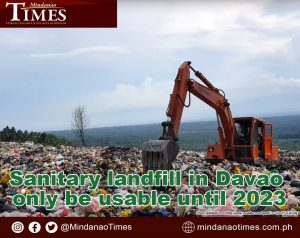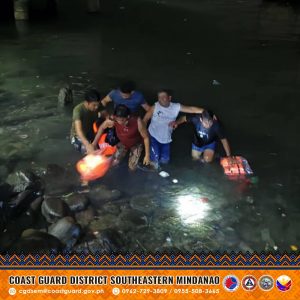DAVAO CITY (MindaNews) – The existing sanitary landfill in Barangay New Carmen, Tugbok here can only last until next year, an official of the City Environment and Natural Resources (CENRO) said on Thursday.
CENRO head Engr. Marivic Reyes told Davao City Disaster Radio (DCDR 87.5) on Thursday that the efforts undertaken in the past by the agency extended the lifespan of the seven-hectare sanitary landfill for a few more years. Still, authorities said it has almost reached the maximum limit.
“The situation now at our sanitary landfill is that it’s nearly filled up. But with our efforts of our team to rehabilitate and compact it, we were able to extend its lifespan. For now, it can last until 2023,” she said.
 She said the local government would expand the landfill after it had acquired an adjacent nine-hectare property, and preparations, including the design, are currently being worked out by the City Engineer’s Office.
She said the local government would expand the landfill after it had acquired an adjacent nine-hectare property, and preparations, including the design, are currently being worked out by the City Engineer’s Office.
She said the local authorities decided to expand the landfill in Barangay New Carmen instead of opening another landfill in a different location.
She said the government, particularly the Environmental Management Bureau of the Department of Environment and Natural Resources, constantly conducts monitoring and collects water samples to ensure there is no leachate from the landfill to nearby Banaag Creek, which is connected to the Pangi River.
She said only 33 out of 182 barangays in the city have material recovery facilities (MRFs) because other barangays don’t have vacant lots to host such facilities for their recyclables.
Reyes added there is an ongoing move to form barangays into clusters and establish MRFs that can be shared among themselves.
She also encouraged households to compost at home to lessen the volume of waste dumped at the landfill.
The City Council passed the resolution proposed by 1st District Councilor Temujin “Tek” Ocampo to urge President Ferdinand Marcos Jr. to allocate a counterpart fund of P3.482 billion to establish the waste-to-energy (WTE) project in the city.
Ocampo believed the WTE would address the solid waste management woes of the city.
Environmental groups in Davao opposed the plan to establish a WTE facility here.
Lawyer Mark Peñalver, executive director of the Interfacing Development Interventions for Sustainability, said incinerators are being fed with plastic or non-biodegradable wastes as fuel to vaporize water in a boiler, creating high-pressure steam to produce electricity.
“However, this process results in the emission of highly toxic substances like dioxins and furans, which are known carcinogenic and can also cause reproductive and developmental problems, among others,” he said.
The city generates around 600 to 700 tons of waste daily, according to the CENRO.
Peñalver said biodegradable wastes comprise 80% of the city’s wastes.
“According to the recent assessment, biodegradable wastes are mostly generated from residences and commercial establishments. Biodegradable wastes can be treated and reduced without burning or incineration processes,” he said.
He said the government should establish a centralized composting and biomass facility and systematic MRF in every Barangay, addressing the main problem of biodegradable waste and segregation. (Antonio L. Colina IV/MindaNews)


